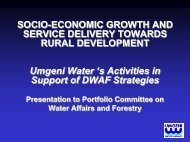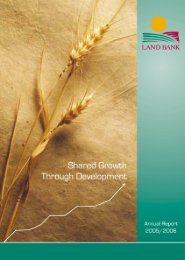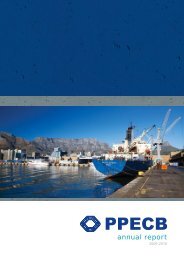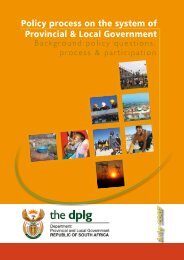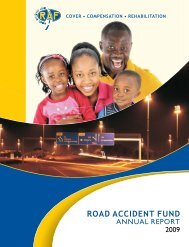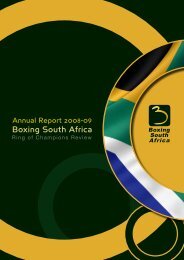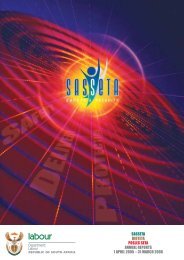Academy of Science South Africa 2005/6 Annual Report
Academy of Science South Africa 2005/6 Annual Report
Academy of Science South Africa 2005/6 Annual Report
- No tags were found...
Create successful ePaper yourself
Turn your PDF publications into a flip-book with our unique Google optimized e-Paper software.
ASSAfProgramme 3The application <strong>of</strong> scientificthinking for the benefit <strong>of</strong> societyThe ASSAf Council is mindful thatthe focus <strong>of</strong> the <strong>Academy</strong>’s workshould be on the scientific analysis<strong>of</strong> already available, enquirygeneratedevidence that can helppolicy development in <strong>South</strong> <strong>Africa</strong>,rather than on prospective research.Year Two: Consensus Study: The science behind effective science education for <strong>South</strong> <strong>Africa</strong>’s youngpeople (Proposers, in various formulations, Dr P Whitelock (MASSAf); Pr<strong>of</strong> B Wingfield(MASSAf); Dr A Paterson (MASSAf); Dr J Sharpey-Schafer (MASSAf)Other topics proposed (if further developed and approved): Food and nutrient security, including therole <strong>of</strong> genetically modified crops; environmentally sustainable cities; climate change in <strong>South</strong> <strong>Africa</strong>;appropriate genetic testing; mental health in a diverse society ; impact <strong>of</strong> donor intervention in the HIV-AIDS pandemic; preparation for possible influenza pandemics; a comprehensive approach to theHIV-AIDS pandemic; language <strong>of</strong> instruction and effective learning in schools; literacy promotion; etc.The ASSAf Council is mindful that the focus <strong>of</strong> the <strong>Academy</strong>’s work should be on the scientificanalysis <strong>of</strong> already available, enquiry-generated evidence that can help policy development in <strong>South</strong><strong>Africa</strong>, rather than on prospective research. This distinguishes its niche from that <strong>of</strong> the science councilssuch as the Council for Scientific and Industrial Research (CSIR) and the Human <strong>Science</strong>s ResearchCouncil (HSRC).Consensus Study: Nutritional influences on human immunity,with special reference to tuberculosis and HIV infectionThe issues concerning nutritional influences on human immunity and response to major pandemicinfections, such as M.tuberculosis (Mtb) and the human immunodeficiency virus (HIV) infections, havebeen amongst the most controversial in <strong>South</strong> <strong>Africa</strong> in the last half-decade. These issues have given riseto serious differences in the approach to public policy in addressing the ravages <strong>of</strong> these diseases. Therehas been a belief in some quarters that poverty and under/malnutrition may themselves be the mainaetiologic agents <strong>of</strong> Acquired Human Immunodeficiency Syndrome (AIDS), with HIV infection beinga non-contributory or trivial supervening circumstance. Others consider nutritional deficiencies to bean, or even the, appropriate target <strong>of</strong> primary therapy <strong>of</strong> “HIV infection and AIDS”. The majority view,however, is that nutritional support <strong>of</strong> persons infected with either Mtb or HIV, or both, is a necessary36 Promoting Excellence in <strong>Science</strong> for Society


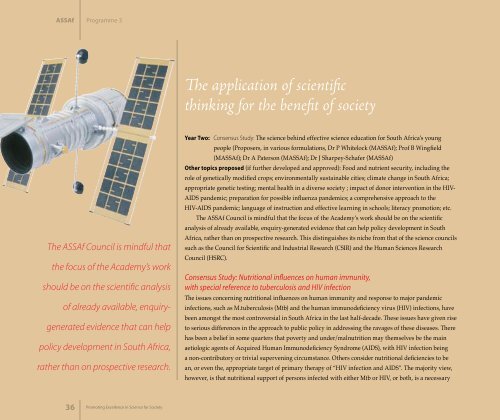
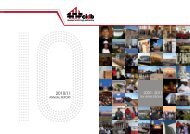
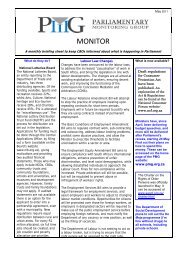
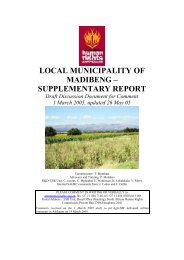
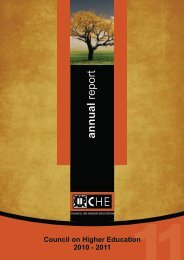
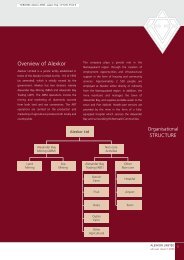
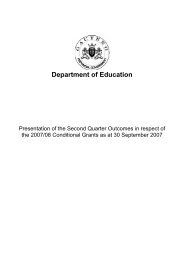
![National Research Foundation Annual Report 2008 / 2009 [Part 2]](https://img.yumpu.com/49774036/1/177x260/national-research-foundation-annual-report-2008-2009-part-2.jpg?quality=85)
